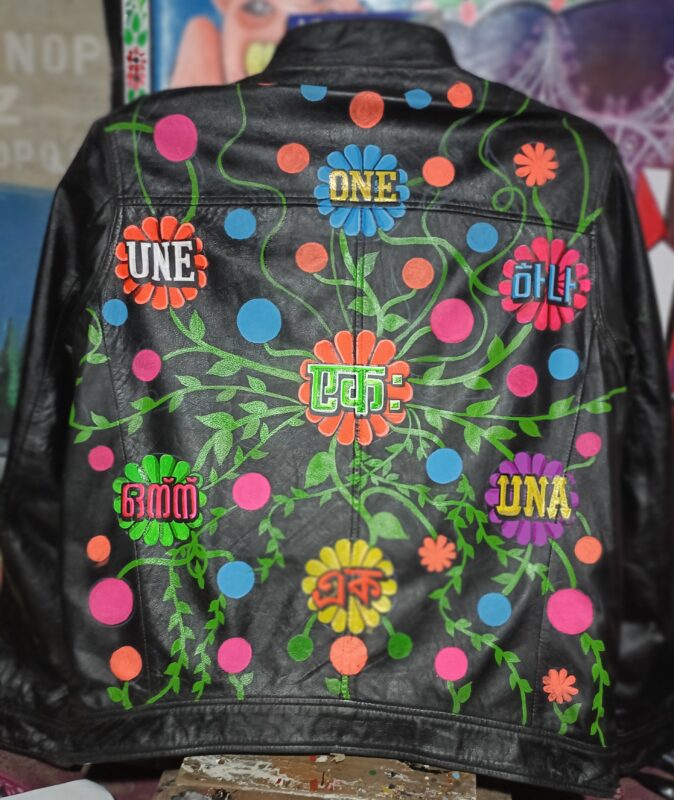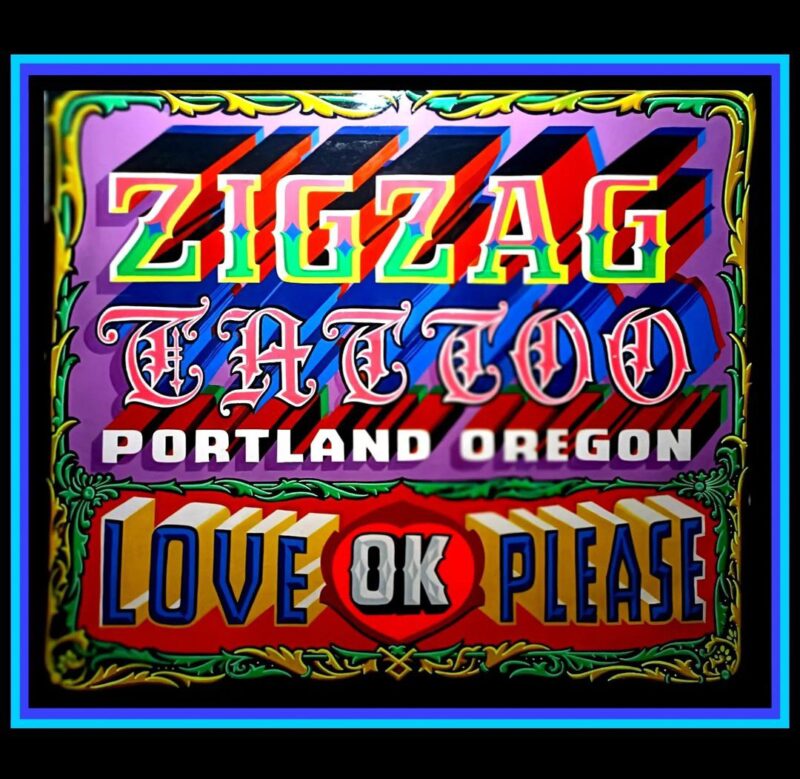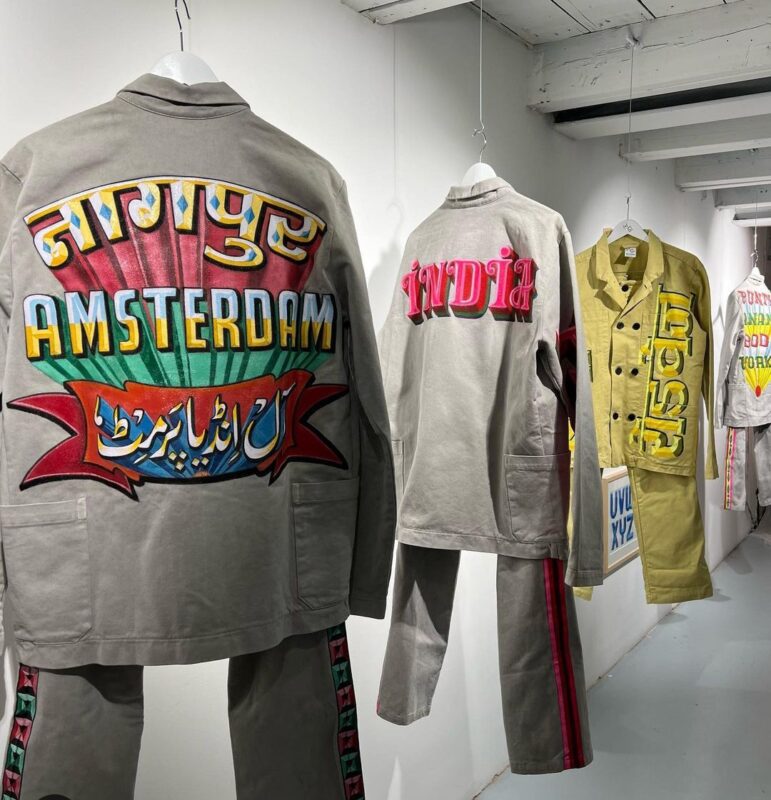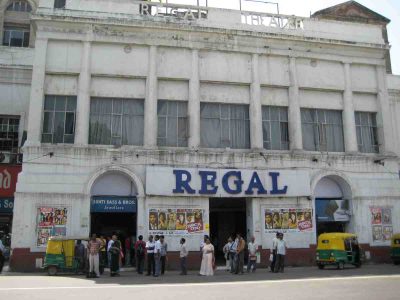On the terrace of a posh apartment in Vasant Vihar, Kafeel Ahmad Ansari is toiling in the hot October sun. He is accompanied by three other artists, including his good friend Aqil Afzal, and four life-sized cut-outs of Shah Rukh Khan, Ram Charan and two German actresses.
They are all working on a project for the Embassy of Germany.
“She is Lola,” he says while pointing at a cut-out of German actress Franka Potente. He finally remembers the name of the film after a brief pause, “Lola from Run Lola Run.”
Kafeel, who is commonly known as Painter Kafeel and works at a humble studio in Matia Mahal, old Delhi, is acknowledged for his unique approach towards sign painting and floral patterns. This expertise has helped him gain global clientele over the years.
Recently, radio jockey Abhinav wore a jacket hand-painted by him to the Cannes Film Festival 2023, Kafeel tells Patriot.

Bollywood star Ranveer Singh could also be seen wearing a jacket painted by him at the opening ceremony of Adidas store at Select City Walk mall, Delhi, he says.
Another jacket hand-painted by him has been exhibited at Galerie De Schans in the Netherlands by designer Farid Bawa.
He was also a part of HandpaintingType, an initiative by designer Hanif Kureshi, which documents the typefaces of roadside painters across India to make it digitally accessible.
Originally from Aonla in Uttar Pradesh, the 69-year-old’s artistic journey began as a practice to improve his handwriting. He fondly remembers his first ustaad (teacher), a man named Maulana Niyamatullah Ansari, who encouraged him to practice his alphabet writing skills extensively, first in Urdu and then in Hindi and English.
“Everyone used to love my handwriting,” he laughs.
“My tutor (Niyamutallah) would ask me to write Urdu letters – aliph, be, te – for three days each. When I reached jeem (fifth letter of the Urdu alphabet), he even taught me how to write its curve properly.”

Around the same time, he regularly visited his neighbourhood to watch Sabir Raza, a local signboard artist, at work. He would spend hours there, observing Raza creating signboards, and was particularly fascinated by the handwriting. The practice soon culminated into artistic apprenticeship.
Raza was already aware of his good handwriting. Seeing a young kid so keen on learning the art of signboard writing, he decided to teach Kafeel how to paint with a brush.
“He gave me two bottles of black and white paint with two brushes and taught me how to create paint layers,” recalls Kafeel.
His father, a muezzin (one who gives call to Islamic prayers) at a local mosque, owned a general store.
Kafeel’s handwriting skills found practical application in the store, where he crafted labels for bottled goods.

“I used to write on the bottles and canisters of chhaali (betel nut), kattha (catechu), paan (betel leaf), zeera (cumin seeds) and kaali mirch (black peppercorn) in Urdu and Hindi,” he says.
He then started to paint local signboards in the village.
However, Kafeel’s professional journey as a signboard artist started when he came to Delhi after his marriage in 1980. He had already faced loss in business at home and was eagerly looking for work in the city.
“I used to observe the signboards on the roads and streets. I loved the letters in Hindi and English, but was quite disappointed by how they wrote in Urdu,” he reflects.
He then started to look for work. However, nobody was ready to employ him because he had no prior experience. Undeterred, he bought a cycle, brushes, paint, and set out to earn a living.
“With a handkerchief and a watch on my wrist, I would make rounds in the city,” he says.
“I decorated the bicycle with tassels, and mounted two plates on which I wrote ‘Painter, Artist, Urdu, Hindi, English.’”
He soon started to get work after negotiations. After some time, he got a job as a sign painter for a soft drink company. He worked day and night for the role, tirelessly learning about new designs. The opportunity continued for approximately a year and opened doors to many ventures, including collaborations with other beverage companies.
“This work made my hand firm and I honed my skills a lot from it,” he says.
Despite various challenges he has faced in life, Kafeel remains calm and composed. He thinks before he starts speaking, often weighing words that come out.
He is aware of his unique artistic style that includes intricate floral patterns, shadows, blends and bevels. He often spends his time browsing art-work of other signboard artists around the world.
“It helps with the inspiration,” he says. “I always aspire for simplicity. Only if the work is large do I use multiple patterns and colours.”
An ardent lover of Urdu language and Arabic scriptures, he learns Quranic surahs (verses) whenever he is not working. During the visit by Patriot, Kafeel was intently listening to an Urdu poem about youth by his friend and co-worker Aqil Afzal.
If he is one of the most known sign painters in Delhi, Kafeel considers Aqil to be one of the best figure artists.
“I may be an all-rounder but he brings the finest figures to the table,” Kafeel says about Afzal.
Afzal, a 74-year-old artist, started his artistic career by painting the posters of famous Bollywood films in the 1980s, including Deewar, Sautan, and Shahanshah.
Afzal is particularly fascinated by the paintings of Raja Ravi Verma, and has copied most of them for his personal fulfilment. With no formal education in arts, he started his journey by visiting a college in Mumbai and sketched models there.
“We used to pay Rs 20-25 each for one session of figure studies in the college,” Afzal remembers.
Both the artists put each other in high regard and share the same fascination for Arabic calligraphy.
As both the artists, along with their apprentice, are ready to go to paint again on the terrace, Kafeel recites the Quranic surah (verse) that keeps him going even at his age.

“Inna ma-al usri yusra, fa-inna ma-al usri yusra,” he recites and translates in Urdu: “Indeed, with hardships come ease. For indeed, with hardships come ease.”
Both the artists then talk about creating something “original”.





